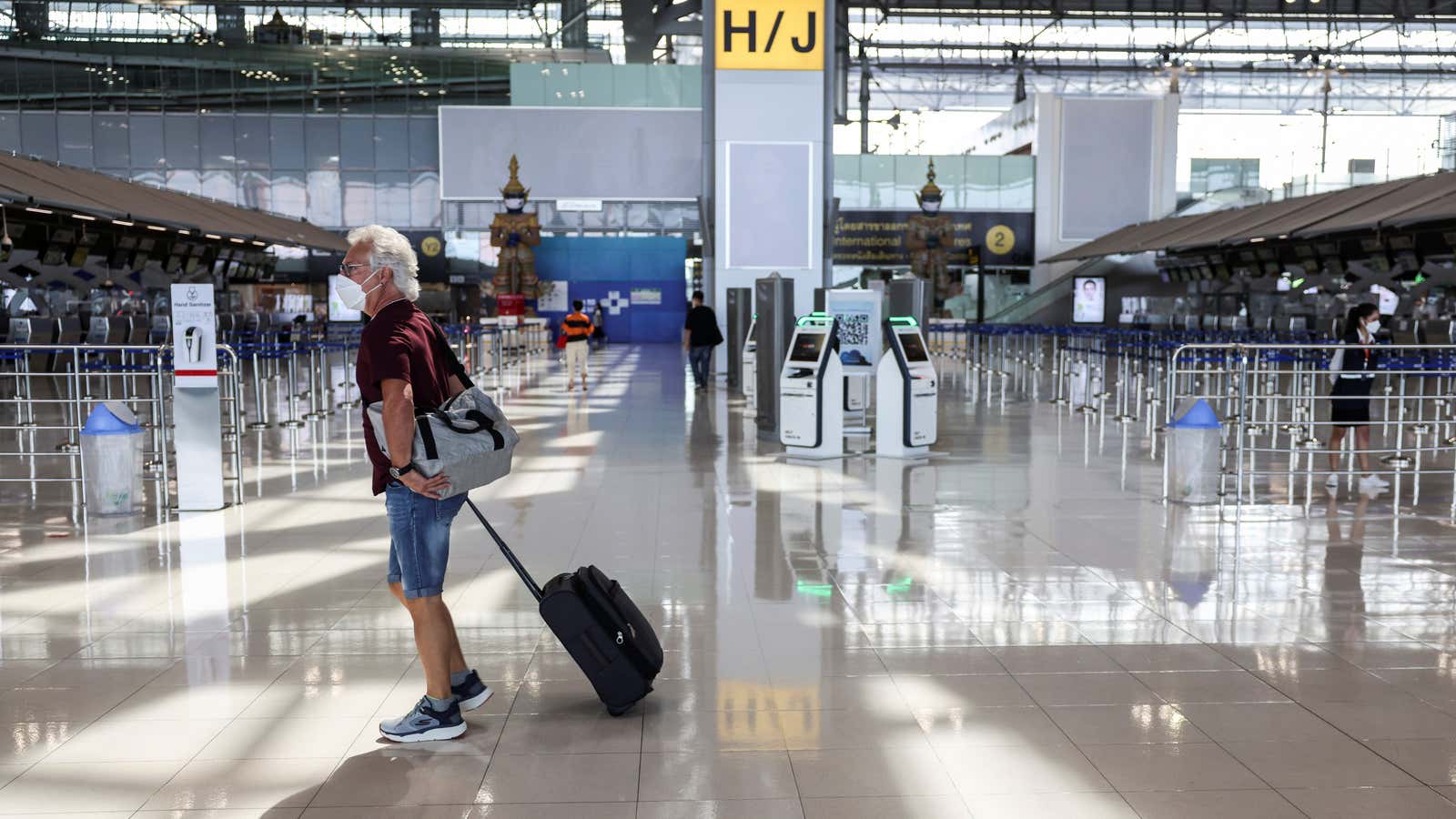It has been a week since South Africa reported the omicron coronavirus variant, and travel bans have been the most visible public health measure that followed.
Governments have used it despite a growing chorus that it doesn’t necessarily work. For instance, the US barred entry of only those coming in from African countries even though omicron has been detected in Europe, the UK, and Israel, too.
The World Health Organization (WHO) has termed these decisions “knee jerk,” and the global health community believes South Africa is being penalised for being transparent about variant data.
Such reactions seem outdated now given the quantum of information available on the pandemic. And yet, governments’ inclination to ban travellers has persisted despite billions being vaccinated quite effectively against covid-19 in 2021.
This could be because there is some merit in such restrictions, though experts caution that it is limited.
Do travel bans work?
“Travel bans could potentially be prudent if a country needs to buy time to scale up public health measures,” said Brian Wahl, an epidemiologist at the Johns Hopkins Bloomberg School of Public Health. “But the time afforded by such measures is measured in days, maybe weeks. But not months or years. Any ban should be accompanied by a plan of action for how that time will be used.”
That rarely happens, though.
When the delta variant caused a catastrophic surge of covid-19 cases in India in April and May, several countries put India on their red lists. The US lifted the restriction only in November. By that time, however, India was reporting only a fraction of the covid-19 cases detected in the US.
Travel bans could not contain the spread of the delta and alpha variants, or even the original coronavirus strain first found in China’s Wuhan, said K Srinath Reddy, president of the Public Health Foundation of India.
“The Netherlands has revealed that samples collected on Nov. 19 and studied later have tested positive [for omicron] in that country. South Africa announced the genomic identification of omicron on Nov. 23,” Reddy said. As such, travel bans that followed South Africa’s announcement could not have prevented the spread in the Netherlands and other parts of Europe.
“With several of the infected persons remaining asymptomatic, we may get many incoming travellers before a variant is recognised,” Reddy said.
When is a travel ban effective?
For travel bans to be effective at delaying local transmission, they need to be implemented as early as possible in the epidemic, according to Wahl of Johns Hopkins. In the case of omicron specifically and covid-19 in general, most epidemiologists believe it may already have crossed that time threshold.
“I do not believe travel bans will work at this stage of the pandemic when the virus is everywhere and variants can emerge anywhere,” Reddy said.
The WHO has detailed guidance on when countries should consider closing international borders but advises against blanket bans. It has a checklist of questions for countries to consider. This covers factors like the rate of transmission in the country of departure, the prevalence of a variant of concern, and the variant’s ability to escape vaccine immunity. In the case of omicron—even with limited knowledge—these questions point countries in the direction of a travel ban.
For instance, countries with a low incidence of covid-19 or those on the brink of a large outbreak and insufficient healthcare facilities could benefit from not having imported cases, according to a study published in The Lancet journal in December 2020. Among the key suggestions in this study was to consider the volume of travellers arriving from a particular country before placing a ban on them.
However, other modelling studies and estimates vary—from travel bans reducing transmission significantly to none at all, according to the WHO.
And yet, the global health body maintains that these restrictions greatly harm economies and human rights. “Evidence, however, suggests that border closures and travel restrictions may be associated with the harms, disruptions, and inequities cited earlier and infringement of the human right ‘to leave any country and return to one’s own,'” according to the updated WHO guidance from July 2.
Why do governments use travel bans?
In most cases, the decision could be a political one and not one based on epidemiological studies. “Travel bans represent reflexive decisions and not reflective judgements. Governments feel compelled to show that they are protecting their people and this is a demonstrative gesture,” said Reddy of the Public Health Foundation.
Instead, it would be more prudent for countries to focus on known measures of mitigation.
“Regardless of what we learn about the omicron variant in the coming weeks, we are not back to where we were at the beginning of the pandemic. We know the interventions that are most effective at curbing transmission, including transmission from imported cases: testing, contact tracing, quarantining, masking, and vaccinating,” Wahl said.
This is currently the approach India is following. As of Dec. 1, all international arrivals from “at-risk” countries will need to undergo testing on arrival, a home quarantine for seven days, and another covid-19 test on the eighth day. “India is setting an example for the world by prioritising reasonable and effective measures,” Wahl said.
This could perhaps be a blueprint for how the world lives with the virus instead of chasing a zero-covid strategy.
